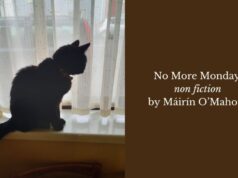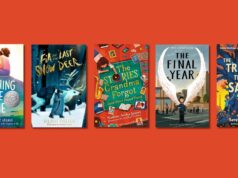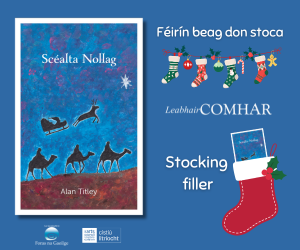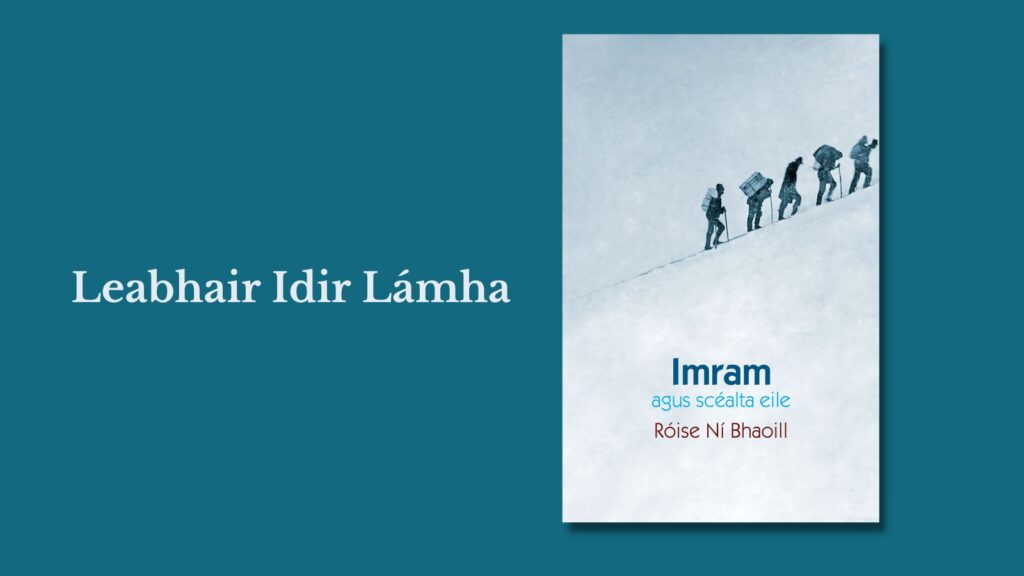
Imram|Róise Ní Bhaoill|Éabhlóid
Journeys, burdens and hopes in Imram, by Róise Ní Bhaoill (Éabhlóid)
by Cathal Póirtéir
It’s always a great feeling when you realise that a writer can entice you to imaginary places and make them real, that her prose style is attractive, and that her stories and characters will be worth spending time with.
Imram is an excellent collection of nine short stories by Róise Ní Bhaoill. She has published work for children and edited collections of folklore, essays and short stories before this but Imram is her first book-length creative work for adults.
Leath na Cailí
The opening story, Leath na Cailí, inspires the excellent cover illustration by Caomhán Ó Scolaí. A group of weary men are struggling uphill with their backpacks in the inhospitable landscape of snow and ice of the Klondike. The story is set back in the times of gold rushes when men crossed the Atlantic in the hope of striking it rich and making their fortunes, before returning home to the place and people they loved to finish their lives in comfort.
We follow a man as he prepares himself and his supplies to keep him alive in this foreign and frozen landscape until he strikes gold. He is guided by the native Tlingit, witnesses the often fatal results of the journey on other gold diggers, and is taken aback by the dubious wonders of Dawson City. His experiences change him and he is no longer the same man who promised to make his fortune and return to his first love.
Like the main characters in Leath na Caillí most of the people in Ní Bhaoill’s stories are dealing with their own journeys, burdens and hopes.
Imram
The title-story, Imram, is narrated in the first person and tells the story of a traveller’s chance meeting in a bus station cafe with a man who is probably about to recite a sob story to get money from his listener.
When the man finally begins to speak he pours out a heart-breaking story of the bloody invasion of his village by religious fundamentalists, and the compromises he had to make to stay alive. He has risked all to escape that new restricted world but at a cost he is still reckoning with.
An Dubh ina Bhán
An Dubh ina Bhán is a story of disillusionment in which a young librarian falls in love with an attractive stranger in a whirlwind romance.
Her fellow workers are jealous but her apparent good fortune disappears as her new partner’s pleasant public demeanour changes in private into physical and emotional violence.
The effect of his coercive control goes so deep that she is ashamed to ask for help. Even though her fellow librarians realise that something is amiss they prefer not to get involved. She realises that the only one she can depend on is herself.
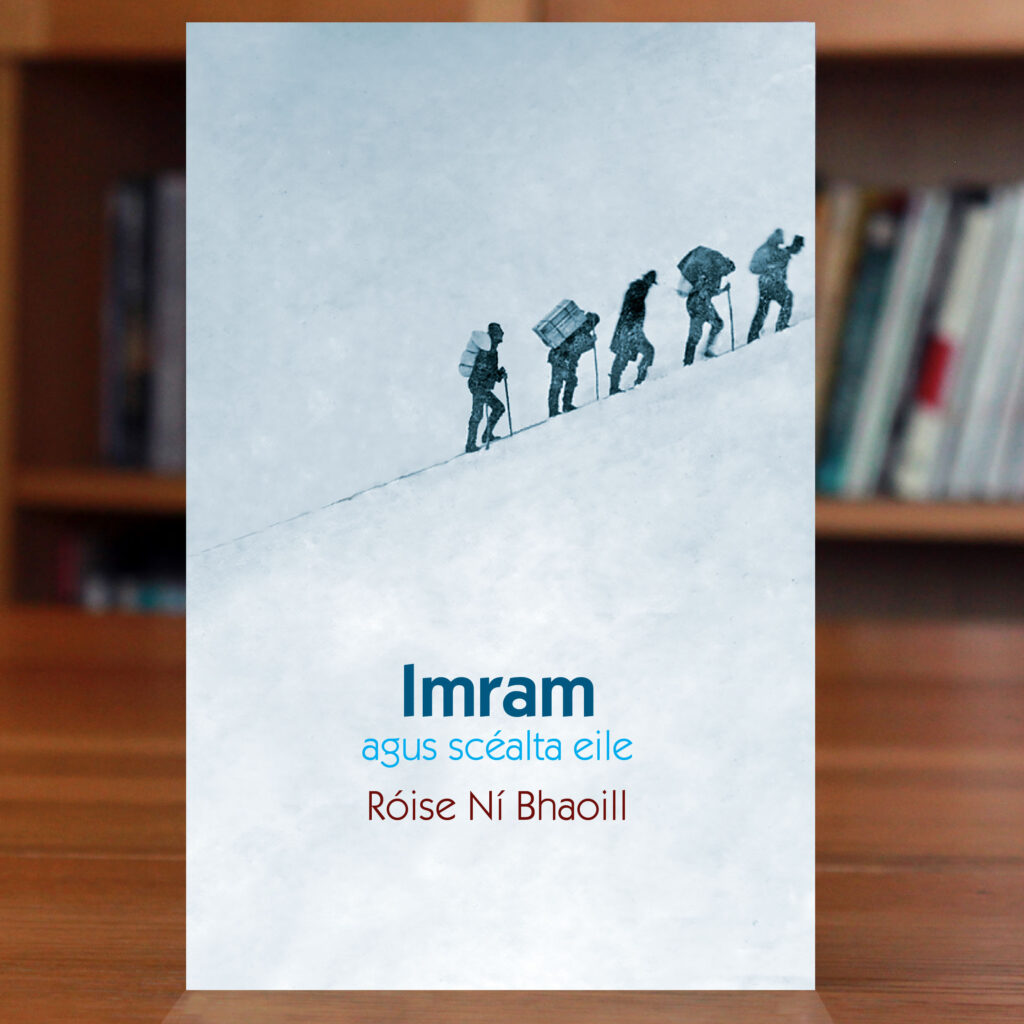
Seomra 393 and Gaolta na gCnámh
Seomra 393 is a dark story that describes the strategy adopted by a predatory male to take advantage of unwitting women who he befriends in a hotel bar where business travellers often relax over a few drinks after meetings in town.
His pleasant demeanour manages to fool visitors into inviting him into their company and he uses well-practiced underhand methods to make sure he can take advantage of a woman as the company breaks up at the end of the night.
In Gaolta na gCnámh a young woman is threated with an arranged marriage by her parents who want her to marry a man from the old country that she has never met.
The announcement takes her by surprise. She had expected to lead her own life as a modern young woman and is taken aback that her mother is going along with the proposed match, having supported her hopes of a university education until then.
Now she understands that the ways of the old country are what hold many of her community together in their new country. If she turns her back on tradition her family will turn their backs on her. She will have to live for the rest of her life with the decision she makes now.
Excellent collection
Breithiúnas Aithrí is a touching story of a woman’s forgiveness for a crime that many would find unforgivable, albeit that it happened more than a generation ago. In Ag Meilt an Ama a lonely widower grows tired of passing his days in the library and starts to people watch on busses and trains. He sees some sad cases but his hopes are raised one day when he thinks he may be witnessing the beginning of a romance.
The shortest story in the collection is Ocras, a snapshot of a couple struggling to come to terms with the loss of their baby. The husband feels that world extends some understanding to his wife, who is struggling with an eating disorder, but that his efforts to get on with life have left him isolated and lonely.
The collection ends with Tearmann in which an old woman remembers her long friendship with a neighbour and how it disintegrated because of dementia. She tries to find traces of her neighbour when new people move into her house—but their renovations have cleared away all traces of her. Her Belfast has changed.
Imram is an excellent collection of well written short stories and a pleasure from start to finish. We meet people who have to find a way of dealing with the pressures their lives have put them under. The places, people and predicaments are very different but Róise Ní Bhaoill displays impressive human understanding and sympathy in each and every one.

Cathal Póirtéir has specialised in researching, presenting and commissioning Irish interest material in various radio formats and in books, including history, literature and folklore in Irish and English, as well as current affairs and drama.









